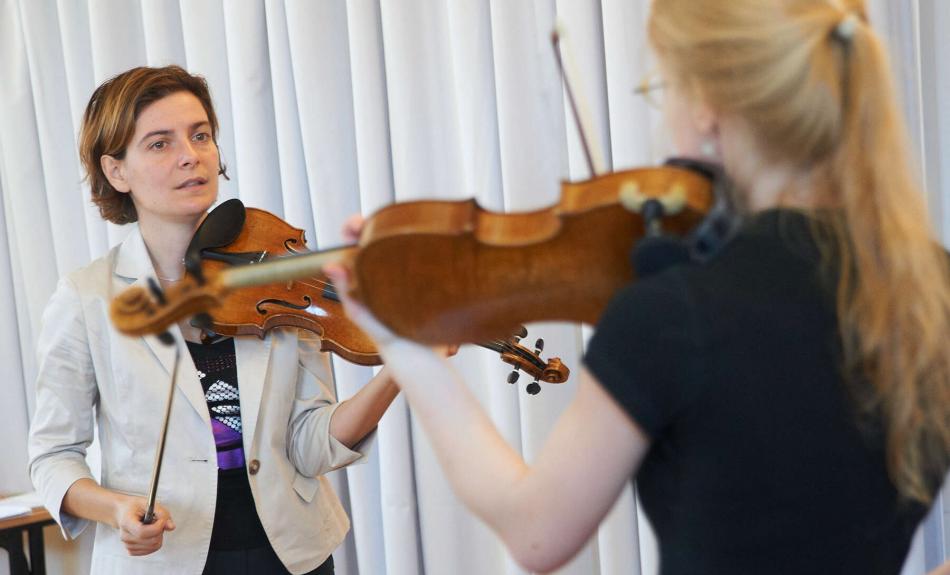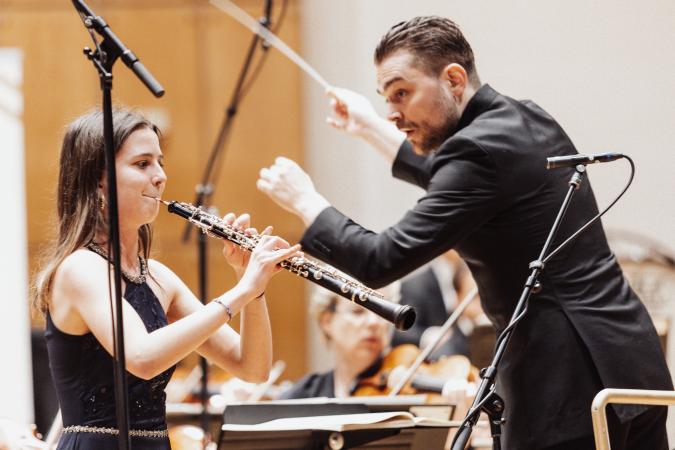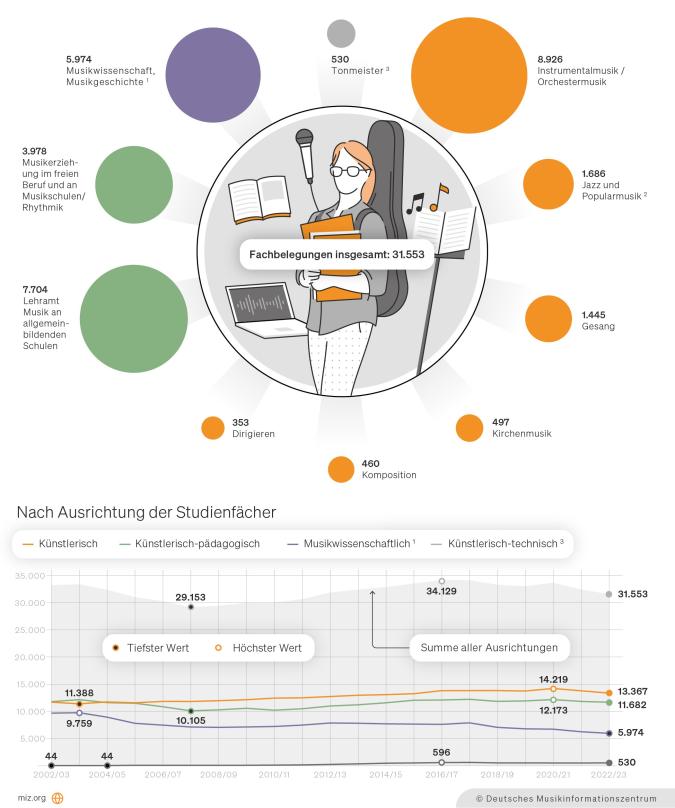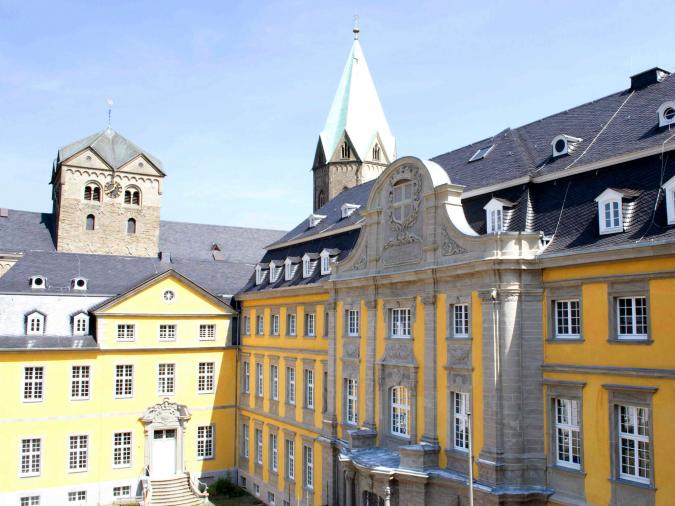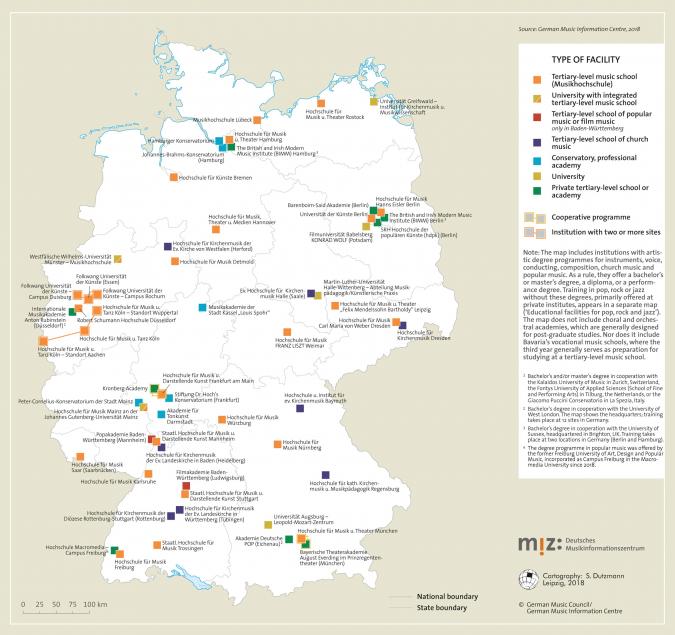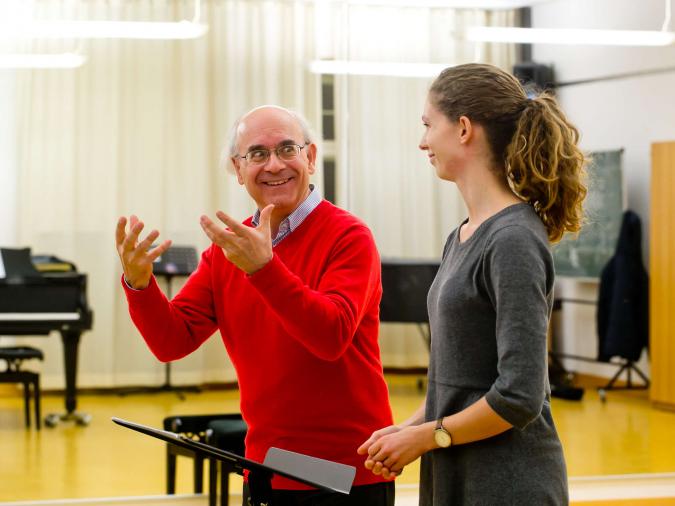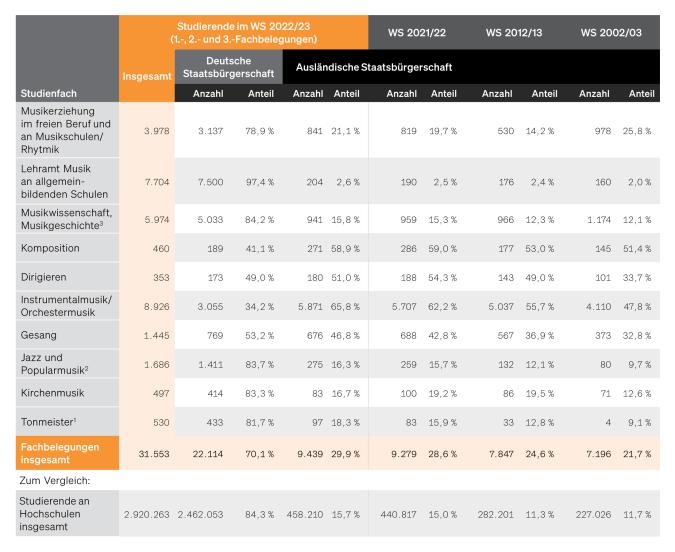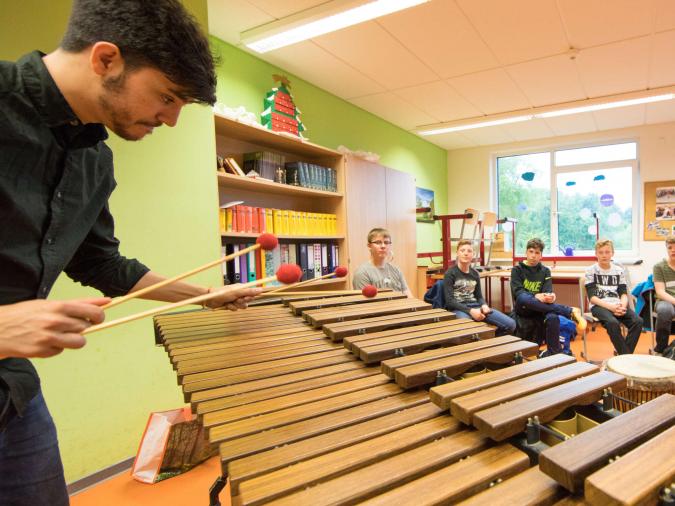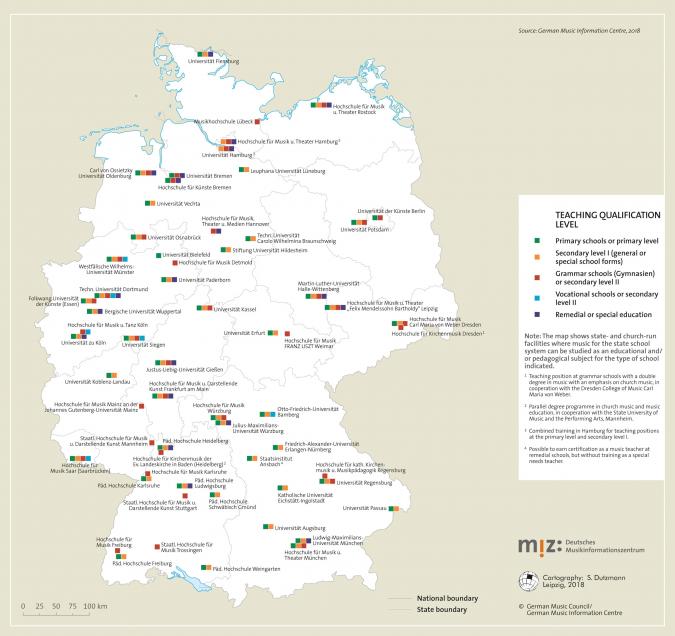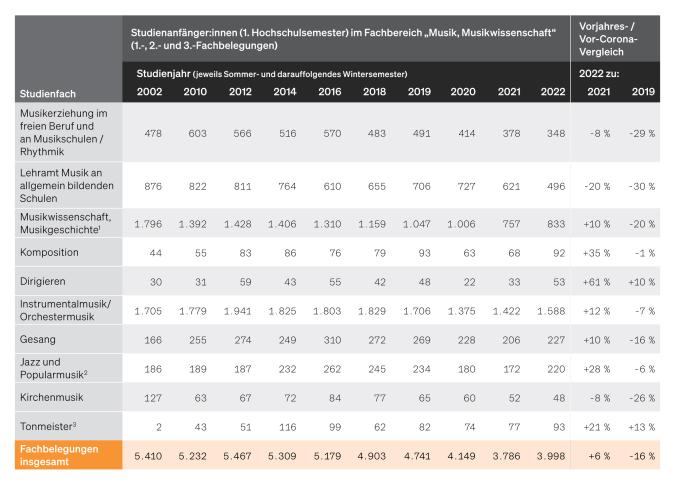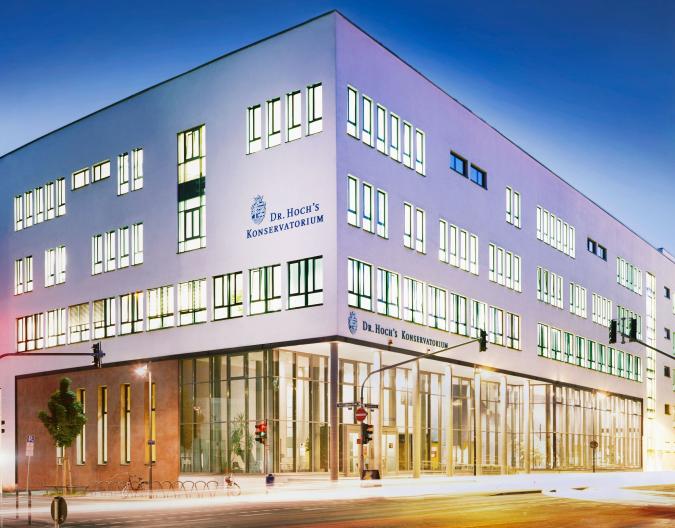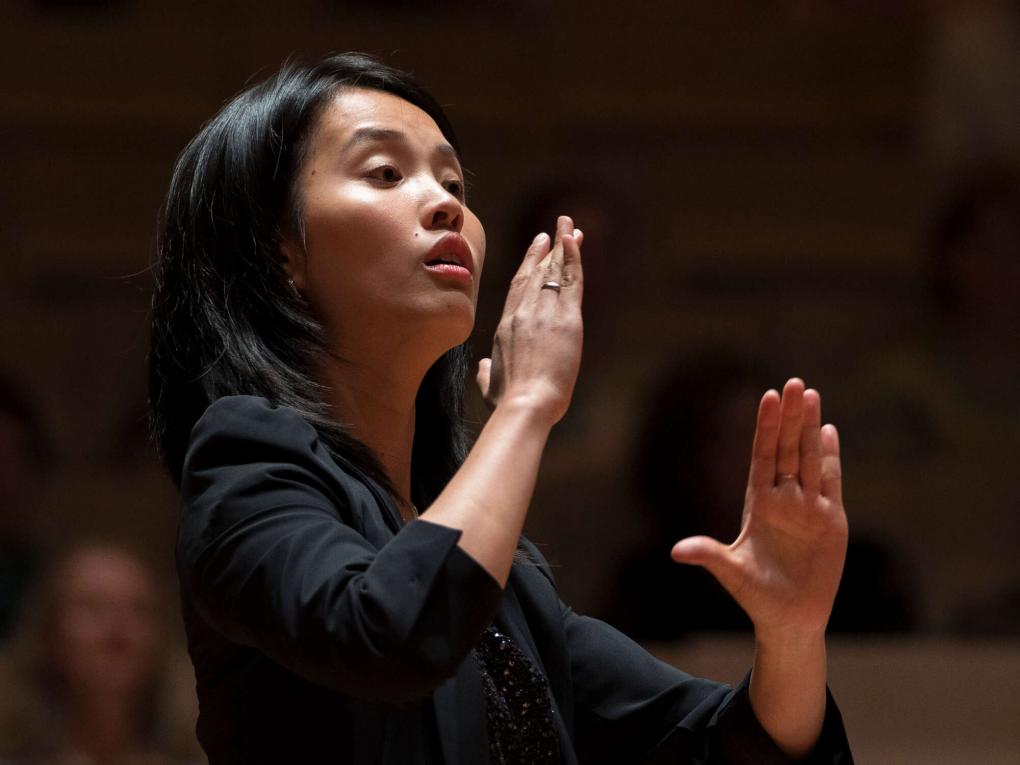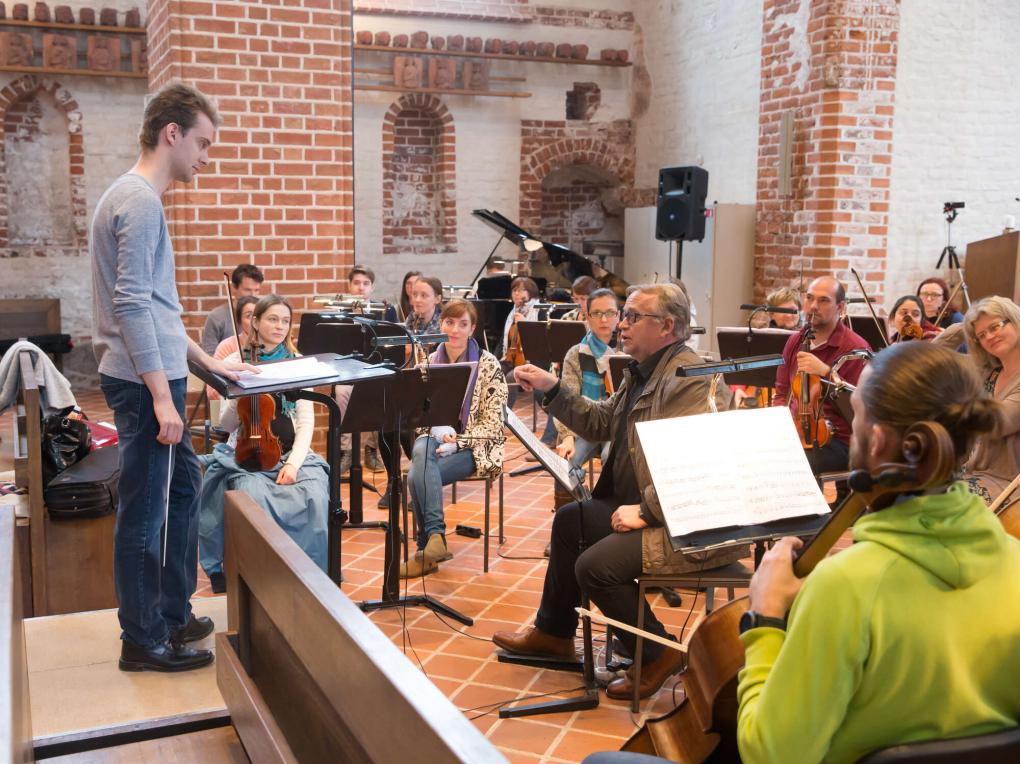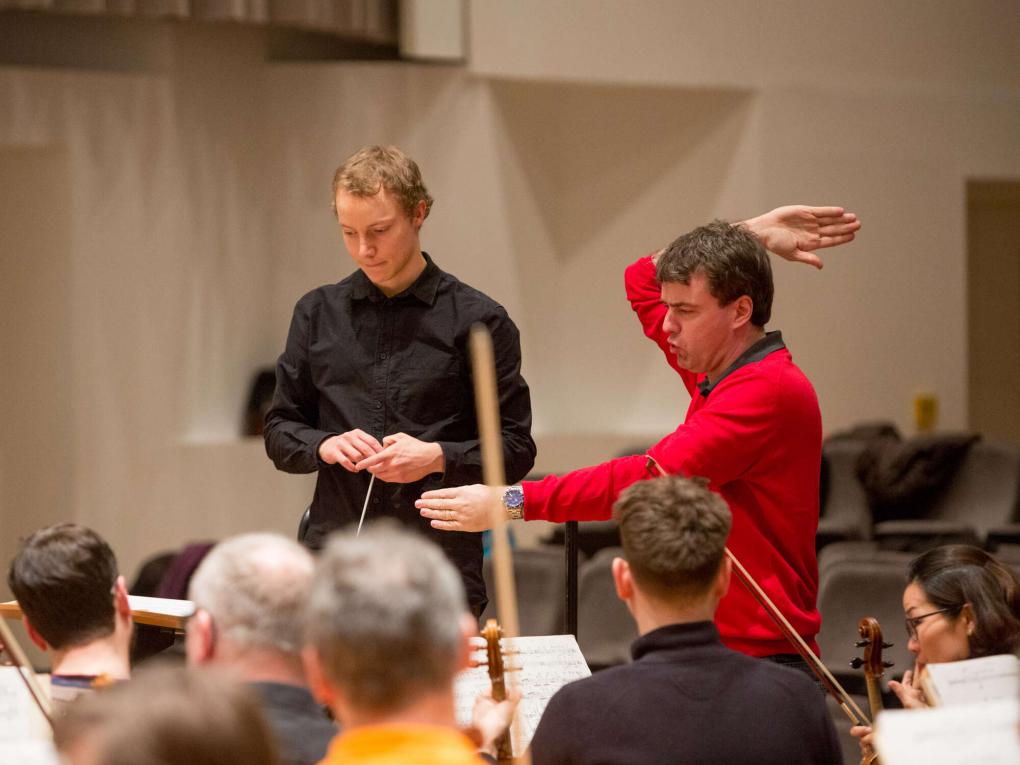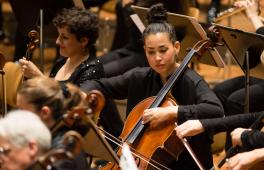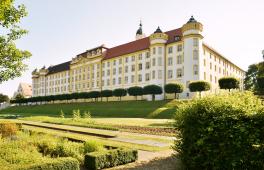Just as music can assume many different forms, the professions directly or indirectly associated with it are equally wide-ranging and varied. Ever since the days of Ancient Greece, theoretical or scholarly studies of music have complemented practical music-making and become a key element of European musical culture. In a larger context, this also involved all those who created the prerequisites for these various professions and activities, whether in a physical sense (e.g. instrument makers) or by research and teaching, including the passing on of performance techniques. At first these complex activities were normally carried out by a single person (e.g. a composer-organiser-performer), but over the years music professions have become increasingly varied, differentiated and specialised. This has given rise to interactions, dependencies and changing relations between music and those who deal with it professionally, all of which unfold within music history and social history alike. [1]
Roughly since the mid-1990s there has been a noticeable increase in the thought given to the future viability of education in many music professions. The reasons lie in the profound changes that music has undergone as a result of economic and social globalisation. Particularly relevant are demographic and sociological developments and the transformations they entail, not only in the social practice of music, but in its reception and consumption. No less relevant is the massive impact of digitisation and new media on the communication of music, affecting every area of its production and distribution. Equally influential are global changes and their associated economic processes.
In this light, music professions are dependent on five factors: social evolution, technological advances, artistic innovations, socio-economic conditions and the appreciation accorded to music by society. Conversely, it is safe to assume that the effectiveness of many music professions will in turn impact the evolution of musical culture. Music professions thus will only have a future if music education is consistently provided by qualified teachers, especially among children and adolescents. Thus, the music teaching professions both inside and outside the state education system are increasingly important, as the German Music Council and the German Music Teacher Association (Bundesverband Musikunterricht) repeatedly pointed out.
Overview
In Germany, training for music professions is sustained by a wide range of specialised institutions: tertiary-level schools of music (Musikhochschulen), teacher training colleges, universities, polytechnics, church music schools, conservatories, music academies, vocational training colleges (only in Bavaria), special public or private institutes (e.g. for popular music (as the Popakademie Baden-Württemberg) or theatrical professions) and specialised training centres for instrument building.
The highly specialised nature of educational programmes for music professions contrasts with the overlapping and duplicated course offerings among the various types of tertiary-level institutions concerned. The differences among these institutions are the result of their divergent historical, regional or conceptual traditions and implicitly touch on aspects of prestige, significance and quality. Thus, music teachers for the state school system receive their training at Musikhochschulen and universities, or, at a regional level, at teacher training colleges. Church musicians can choose courses at Musikhochschulen or special tertiary-level schools of church music; and degrees for instrument or voice teachers are offered not only by Musikhochschulen but by music academies, conservatories and even several universities. One special instance is Bavaria’s vocational training colleges for music (Berufsfachschulen), which function as the first stage in professional education. The training lasts two years and ends with state certification in ensemble or choral conducting or a comparable degree in popular music or with a certificate as assistant church musician.
In the winter semester of 2022-23 roughly 31,500 students were enrolled in degree programmes for music professions at a university level (excluding conservatories and music academies), with more than 59 per cent attending Musikhochschulen. Roughly 42 per cent (=13,367) of the students were trained as practicing musicians. 37 per cent (=11,682) sought teaching certificates and 19 per cent (=5,974) pursued degrees in musicology (see Fig. 1).
The growing demand for international compatibility of degrees, called for since 1999 by the so-called ‘Bologna Process’, and the resultant introduction of bachelor’s and master’s programmes led to fundamental structural reforms in the tertiary-level study of music. The duration of degree programmes has also become more differentiated. For performance and composition, the Standing Conference of the Ministers of Education and Cultural Affairs of the Länder in the Federal Republic of Germany (KMK) has prescribed four years for a bachelor’s degree (B.A.) and an additional two years, if desired, for a master’s (M.A). Apart from that, at least three years are envisaged for a bachelor’s degree at university level, and an other one or two for a master’s. [2] The Bologna Process has led many tertiary-level institutions to set new emphases and to introduce new courses of study, thereby creating many possibilities for individual profiling among the students and new options for interdisciplinary coursework. These include a range of practice-orientated courses that are easier to integrate into the module concepts of the training curricula thanks to the Bachelor's/Master's system. For example, the University of Music Lübeck includes additional degrees in popular music, elementary music pedagogy, instrumental and vocal pedagogy, performing arts (as part of the dual degree programme) and music theory in its school music (grammar schools).
Training for performers and composers
Musical training in the narrow sense relates first and foremost to the practical activities of musicians as instrumentalists, singers, orchestra conductors, choral and ensemble directors, or musical authors (composers, arrangers, songwriters or similar professions). Accordingly, these forms of education have traditionally stressed ‘major subjects’ or ‘main instruments’ such as piano, cello, horn, choral conducting or composition. The subcategories in this field focus mainly on the repertoire to be studied and relate to potential areas of professional activity and/or generic specialisation, e.g. solo artist, orchestral musician, lied, opera or oratorio singer, big band, instrumental ensemble, chamber music as well as early and contemporary music. This more ‘classically’ orientated range is expanded by numerous possibilities in popular music in the broadest sense, film music, electronic music or jazz. These are often combined with the digital possibilities of music production (audio design, electric music production, etc.). There are also specialised Master's courses, e.g. ‘Music and Creative Industries’.
The principal centres for obtaining professional training in performance, composition and conducting in Germany are its Musikhochschulen, some of which date far back in history, having been founded as conservatories in the mid-19th century. They are organised either as self-sufficient entities or as part of a larger institution covering several art forms. Two of them, the Folkwang University in Essen and the University of the Arts in Berlin (UDK), have even achieved university status. Often, they combine their course offerings with training in theatre or dance, as in Hamburg, Cologne, Munich, Leipzig, Frankfurt and Stuttgart. Conversely, they can offer non-artistic degree programmes, such as media management or media and music (at Hanover Hochschule for Music, Drama and Media) or cultural and media management (at Hamburg Hochschule for Music and Theatre). The Musikhochschulen are spread among Germany’s federal states in varying levels of concentration: there are five in Baden-Württemberg, [3] four in North Rhine-Westphalia, three in Bavaria, two each in Berlin and Saxony, and one in most other states.
In terms of legal status, the 24 Musikhochschulen are grouped together in the Conference of Rectors of German Conservatories (RKM). Being state-run institutes of higher learning in the arts, they have the following goals and missions:
- to impart artistic and educational knowledge and skills,
- to develop and communicate knowledge in musicology and music theory
- to conduct research initiatives in scholarly disciplines and artistic development projects, and
- to guide students in mastering their craft.
One way that the RKM pursues these goals is through three competitions devoted either to artistic practice (Felix Mendelssohn Bartholdy Competition, in cooperation with the RKM since 1963), to music education and communication (Music Education Competition, since 2009) or to innovative concert formats (‘D-bü’ Competition, initiated in 2017). [4]
Besides the option of studying at independent Musikhochschulen, music degrees can also be obtained in Mainz (where the Musikhochschule is part of Mainz University), Münster (where it is part of Münster University) and at various conservatories or music academies (generally in conjunction with a Musikhochschule). A few private educational establishments also offer courses of study in special fields such as singing or popular music. One example is the Popakademie Baden-Württemberg, a facility operated by the state of Baden-Württemberg in cooperation with the city of Mannheim and partners in the media, making it a Hochschule and skills centre for the music business and the music scene rolled into one.
The fundamental prerequisite for starting a course of study in music is proof of special musical and artistic aptitude, which is determined in a lengthy process tailored to the degree programme concerned. The very large number of contestants for places of study at Germany’s learning institutes in the arts is international in scope, and the question is often asked whether the number of foreign students should be restricted. In 2022-23, for example, 66 per cent of students enrolled in instrumental and orchestral music were from foreign countries, along with 59 per cent in composition and 51 per cent in conducting (see Fig. 3). The selection process of talented students is based on numerous aspects, but essentially on the capacity of the universities and the individual qualifications of the applicants. In the foreground here are the extremely high demands that the later professional practice of artistic excellence requires. At the same time, however, against the backdrop of the imbalance between applicants on the one hand and positions offered in the desired profession, the question must be asked as to whether and to what extent these students later have a concrete career perspective - based on the respective degree programme. To address the tension between the original career aspirations and the job reality, a training structure geared towards versatility is required, which not least creates patchwork-like job profiles. Against the background of the current exorbitant shortage of music teachers in all federal states and in all types of schools, career changer programmes offer fields of work that combine direct active music-making with a music education impetus (see also the article "Musik in der allgemeinbildenden Schule").
Another discrepancy between course of study and professional outlook, at least in some disciplines, results from the percentages of female students. For example, 39 per cent of students enrolled in conducting programmes in the winter semester 2022-23 were women, even though female conductors continue to be woefully underrepresented, especially in orchestras. [5]
Although the course offerings are based on the requirements of later professional practice (e.g. an instrument, voice, composition or conducting), they are also combined with secondary fields of study such as music theory, music education or musicology. Now that degree programmes in the arts have been converted to the BA/MA system, the previous advanced or specialist degrees have been mainly subsumed in master’s programmes. Increasing importance has recently been attached to specialisms in concert education, music appreciation or music management.
A special combination of music and applied science is offered by the studio engineering programmes at Berlin and Detmold as well as the audio-visual engineering programme held jointly by the polytechnic and Musikhochschule in Düsseldorf. Interested students can also take a degree in music design at the Musikhochschule in Trossingen.
Degree programmes in church music are similarly noted for combining artistic subjects with other disciplines, particular theology and, increasingly, education (see the essay ‘Music in Church’). Another educational task is assumed by the opera studios attached to various opera houses, which seek a more practical orientation. Some opera houses have entered cooperations with Musikhochschulen, in which case the course units are shared with the Hochschulen; otherwise they are held entirely in the opera house. Although such co-operations are generally welcomed, the co-ordination of these two quite different institutions can pose challenges, not least because educational facilities place different expectations and standards on their students than opera houses do on their ensemble members. [6]
Finally, music therapy has become increasingly important in recent years. The subject is currently offered at two of Germany’s music colleges and several other higher education institutes, generally as a Master’s programme. [7] The degree programme imparts skills and knowledge that enable a combination of artistic, therapeutic and scientific competences to be used professionally and purposefully in interdisciplinary fields of work in health, education and social services.
All these institutions are under great obligation to provide optimum preparation for students’ future careers, which are generally very difficult in the arts. This obligation is best described in terms of practical training related to the needs at hand, and thus as a balanced and personalised combination of excellence, self-organisation, self-motivation and indispensable individual initiative. Given this situation, the early promotion of musical talent has gained more and more in importance at Germany’s Musikhochschulen, especially over the last decade. Many tertiary-level institutes have set up programmes specifically for the promotion of gifted children. This reflects the special nature of artistic development, which necessitates long, intensive and high-quality study prior to the onset of professional training (sometimes even at the pre-school level), especially in such instrumental subjects as violin, cello and piano.
In addition to the subject-related content, incidents at conservatoires and universities have led to debates on the extent to which the problem of proximity and distance is evident in music education. [8] The need for education and action in this area has become obvious again and again in recent years and has been addressed accordingly by the Rectors' Conference of Universities of Music. [9] Particularly in one-to-one lessons, which are crucial for the training of musicians, the boundaries between concrete assistance and sexual assault seem to be blurred and require special attention from both teachers and students.
Training for music teachers
Educational activities in the state school system
The training and professional profile of music teachers for Germany’s state school system are rooted in the early history of its church and municipal school traditions and the voice lessons offered there. Building on the reforms initiated by Leo Kestenberg, music was introduced in the state schools as a field of instruction. [10] The training concept for prospective music teachers developed at that time is still relevant today and comprises in the first phase (university) a three-tier model that includes artistic, scholarly and educational components. A second phase consists of an internship (Referendariat) in which a solid theoretical training is related to practical tasks specific to the teaching profession.
In the first tier, teacher training differs fundamentally depending on the form of school at which the student seeks to teach. Training for Germany’s grammar schools (Gymnasien) and for many schools of secondary level I (which bear different labels depending on the state involved but generally cover grades five to nine or ten) calls for two major subjects, such as music and mathematics, plus additional coursework in education and pedagogy, often augmented by units in psychology. In response to the challenges posed by the growing number of languages at Germany’s schools, a mandatory or ‘obligatory elective’ subject in German as a second language (‘Deutsch als Zweitsprache’, DaZ) is sometimes added as well. The colleges and universities that train music teachers meanwhile consider it necessary to prepare for the challenges associated with inclusion.
The degree programmes also include lengthy periods or even full semesters of practical application in order to gain a clearer view of the profession and to align studies with the demands of day-to-day school operations. The resultant links lead to meaningful cooperations between tertiary-level institutes, teacher training colleges and state schools.
The Conference of the Ministers of Education and Cultural Affairs (KMK) has ratified requirements for subject areas and methodology in teacher training programmes. [11] Though intended to regulate this field and to create nationwide compatibility, they have been implemented in quite varying ways by institutions in the various states. For primary schools, which generally cover grades one to four (but also grades five and six in some states), and for special schools, [12] the coursework largely relates to mandatory subjects or majors (usually German and mathematics), optional electives or combinations of subjects (including music) and courses in education, augmented as applicable (see above). The number of course credits devoted to electives differs markedly from state to state, and in the case of music it sometimes lies beneath a meaningful level for qualified teaching at primary schools.
Music teachers at Germany’s grammar schools (sometimes combined with teaching positions at comprehensive schools, or Gesamtschulen) receive their training primarily at Musikhochschulen. [13] Several universities also offer a course of study in this field. Training for music teachers at other types of school is largely the responsibility of universities and teacher training colleges, though in some states this field is also offered by Musikhochschulen.
Nearly all educational institutions require prospective music teachers to pass an aptitude test before being admitted to a degree programme. In recent years this test has been considerably improved and expanded in its quality. Rather than functioning as a sort of subjective measuring stick for artistic potential, it has become a sophisticated prognostic tool for determining a student’s aptitude for the teaching profession, by including such criteria as communication skills and basic abilities in ensemble direction and music-making in schools. Some institutions now also dispense with an aptitude test and simply ask applicants to write a letter of motivation for the teacher training programme with music as a teaching subject. However, whether this can achieve a professionalisation in music education is an open question. Presumably, the corresponding curricula would also have to be reconsidered in such cases.
In recent decades the contents and methodology of teacher training courses in music have changed markedly in the face of professional reality. Among the changes are the inclusion of relevant subjects (e.g. popular music, digital media, ethnomusicology resp. transculturality or inclusion and the handling of equipment) and the communication of a broad range of activities in music instruction (e.g. co-operative learning methods, classroom management and project work). There have also been shifts in the acquisition of musical skills that lend greater weight e.g. to classroom piano and instrument performance, improvisation, ensemble work, and choral and vocal training for children
In sum, it has become essential for students to receive an opportunity to work out personalised pathways in their studies. This also applies to advanced scholarly work in music education and musicology (doctoral degrees and inaugural dissertations).
Thanks to the conversion to bachelor’s and master’s degrees, many educational institutions have been able to reassess their teacher certification programmes and to interact more closely with other courses of study in the interest of achieving ‘polyvalence’. We hope to see solid investigations of these new structures in the near future, enabling them to be corrected and improved.
The second phase of teacher training, preparatory service, usually lasts 18 months. Legally independent, it serves to expand the practical skills that students acquire for the teaching profession during their studies. Usually, it comes to an end with a state examination. [14] The training sought for teacher certification takes place at university departments or schools of education as well as at state schools. It is provided by trainers with special scholarly and practical expertise, supported by teachers in the state schools. During this preparatory service, the training combines theoretical instruction, sample lessons and theory-guided reflections related to music instruction. Besides events at training colleges, special importance is accorded to job shadowing and classroom teaching, whether supervised or independent. Although the under lying KMK paper explicitly warns against it, the amount of independent instruction is quite large in many states, sometimes already beginning at the start of the training period. The suspicion therefore arises that the training character of preparatory service is being summarily dismantled to conceal the actual need for teaching.
One special form of training for music teachers is the so-called ‘dual subject teacher’, i.e. a teacher with ‘music as an extended subject of instruction’, which is offered in several states for teachers. [15] This allows prospective teachers to acquire a specific musical profile that enables them to set points of emphasis both in classroom instruction and in the life of their school (e.g. classroom music-making and choral, band or orchestral work). On the other hand, owing to the absence of a second (or even third) subject of instruction, it is often more difficult for school authorities or headmasters to employ such specialists flexibly in their day-to-day school operations.
At present it is not possible to meet the need for qualified music teachers in all forms of public schools, nor is this likely to be the case in the future, given the changes in society, the aging of music teachers and the growing number of pupils. The shortage of trained music teachers, especially in primary schools, is part of a larger problem, namely, the shortage of teachers altogether. (see Fig. 5) The lack of specialist teachers for the subject of music is part of the general shortage of teachers. Although there have recently been signs of an improvement in the general shortage situation at primary schools, [16] this is not the case in music, where the deficit of specialist teachers is the highest of all school types. However, the programmes for career changers and lateral entrants promoted by the regional ministries of education do not solve the fundamental problem.[17] As there are still no quality standards that apply throughout Germany for the training of career changers and lateral entrants, there is a risk of the de-professionalisation of the music teachers’ calling. On the other hand, multivariate covariance analyses show that lateral entrants have similar subject and didactic knowledge, but have lower scores on the pedagogical-psychological knowledge test than traditionally trained teacher trainees. There are no significant differences in motivation and convictions. However, there are significant differences in self-regulatory skills. [18]
From this vantage point, job prospects for fully qualified music teachers in the state school system can be described as good.
Teaching instruments and voice outside the school system
The training of instrument and voice teachers for use outside Germany’s general education system, especially at public and private music schools or in a self-employed capacity (sometimes in co-operations), takes place at Musikhochschulen, music academies, conservatories and in some cases at universities. Here, too, before embarking on this course of study the student must pass an aptitude test. Besides theory and ear training, these tests focus on the students’ musical competence through an audition in their chosen field. With regard to the combination of core subjects, these institutions barely differ in their course requirements: a main instrument or voice, a second instrument, theory, ear training and musicology are generally compulsory, as are courses related to the teaching profession (instrument or voice education, methodology, music psychology, ensemble projects, vocational issues and internships with test teaching sessions or the like).
The breadth of subject matter called for in public music schools by the school curricula and the ‘Music Education Plan for the Elementary and Primary Level’ [19] is reflected in the training given to instrument and voice teachers. Besides a mastery of their voice or instrument, teachers are expected to have acquired educational, scholarly and methodological abilities and skills during their studies. As late as the 1970s training was based around individual lessons. But the traditional field of activity of the instrument or voice teacher has substantially expanded with changes in the day-to-day reality of teaching, the inclusion of elementary music and lifelong learning in public music schools, and the co-operative supervision of wind, string and choral classes in the general education system.
Thus, the teaching qualifications acquired today relate to the training of amateurs of every age and every level of proficiency. They include preschool lessons as well as training for a professional career and cover every recognised form of instrumental and vocal instruction, from individual lessons to the teaching of large groups. Instructors now have to pass on additional skills, e.g. in improvisation, elementary ear training, organology, dance, physical movement, stage acting and the basic treatment of the human voice. Moreover, greater expertise in musicology, music education and psychology is crucial, particularly in view of the altered nature of the profession. Scholarly work in instrumental and vocal instruction has been singled out for expansion at various learning institutions, paving the way for scholarly certification (i.e. doctoral degrees).
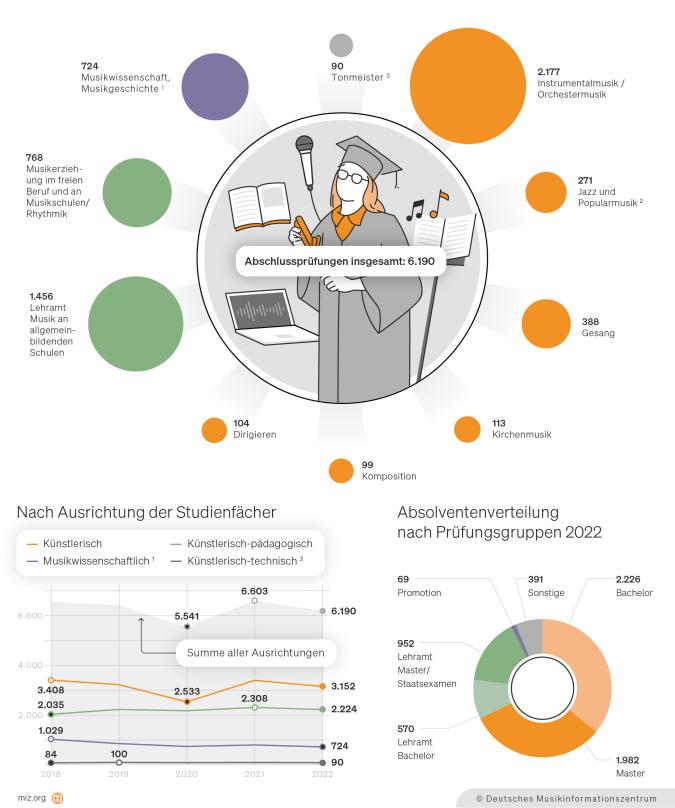
Not least, the political initiatives that have gained increasing social significance under the names of ‘JeKi’ (short for ‘Jedem Kind ein Instrument’, or ‘An Instrument for Every Child’), ‘JeKits’ (‘Jedem Kind Instrumente, Tanzen, Singen’, or ‘Instruments, Dancing and Singing for Every Child’) or ‘JEKISS’ (‘Jedem Kind seine Stimme’, or ‘Every Child Has Their Own Voice’) will succeed only if instrument and voice teachers command additional expertise in broad-based music education. The same applies to co-operative wind, string and choral classes, which now exist in every type of school in every federal state. They are generally taught jointly by state school music teachers and instrument or voice teachers. Both courses of study have given rise to new educational tasks resulting from the large number of instruments, the divergent levels of motivation and the structure of small and large groups. These tasks can only be efficiently carried out, on the basis of the modular BA/MA system, if new forms of teaching the curricula are incorporated on a trial basis in the early conceptual stage of educational and interdisciplinary events.
In 2022 nearly 700 students successfully completed degrees majoring in instrument or vocal teaching at Germany’s institutes of higher learning. The slightly larger number of degrees in this area (768, see Fig. 6) partly results from the fact that many students (e.g. orchestra majors) use the degree to expand their career prospects, thereby avoiding the generally tight job market for artistic professions in favour of neighbouring fields of activity or augmenting their original chosen profession.
Another course of study for activities outside the state school system is elementary music education, or EMP (Elementare Musikpädagogik), which has a special task in connection with public music schools, day care centres, primary schools, retirement homes and church congregations. EMP initiates and promotes ‘learning music with all the senses’, e.g. through singing, physical movement, listening to music, improvising and playacting, regardless of the age or proficiency of the learners. [20] In view of the ongoing changes in society and culture, EMP teachers are facing new areas of work that require preparation at tertiary level: cultural dialogue in teaching children from migrant families, overlapping areas of instruction for primary and special schools, and educational advancement and special training in music for educators, primary school teachers and special education teachers. In all these areas there still exist training deficits because, alongside the musical and technical demands, additional educational requirements have arisen that have barely been addressed to date.
Besides the new points of emphasis within current educational structures, the past years have also witnessed the introduction of many course offerings, frequently as master’s degree programmes, with emphases of their own, e.g. on music appreciation/concert education, music therapy or training for special age groups (conducting children’s and youth choirs). This is an added benefit of the BA/MA system: it opens up opportunities to strike a balance between artistic and educational perspectives and to work more deeply and purposefully toward professional qualifications that go far beyond the traditional picture of an instrument or voice teacher.
Still, to complete a degree is not tantamount to entering the workforce as an instrument or voice teacher. Moreover, the working conditions and payment of casually employed instrument and voice teachers (e.g. owing to temporary contracts and varying numbers of lessons) are constantly subject to debate. Professional associations and unions are currently working to change this situation. Viewed in this light, the straightforward image of an instrument or voice teacher is destined to become obsolete. Instead, we will face a new type of teacher working in different fields with various employers. Yet precisely the patchwork nature of these music-educational activities can make them attractive.
Taking together all these aspects of the expanding professional image, the need for broadly trained instrument and voice teachers will grow in the near future. Thus, from the standpoint of the Association of German Music Schools (Verband deutscher Musikschulen, or VdM), the core responsibility of traditional instrument and voice instruction will remain intact. The students’ career prospects will depend directly on the breadth of courses offered at their particular Musikhochschule, university or conservatory, and on the open-mindedness of the students themselves.
Prospects for the future
Despite the long, intensive and high-level training necessary in the arts, professional prospects after graduation are generally hard to predict. In particular the German job market for orchestral musicians has changed significantly over the last 20 years, especially given the roughly 20 per cent decline in permanent jobs owing to the disbandment or merging of orchestras since 1992 (see also the essay ‘Professional Orchestras’). Similar trends can be noted in music theatres and professional choruses. To be sure, the so-called ‘free music market’ grants opportunities to play in or establish ensembles on a freelance basis, often with groups specialising in early or contemporary music. How ever, this frequently leads to the vagaries of self-employment and to patchwork careers that rarely manage to cover basic living expenses [21], which is why more than two thirds of professional musicians in Germany also pursue music education and/or non-musical activities in addition to their musical and artistic work. [22]
In the teaching professions, it is already becoming clear that the need for cooperative ventures in music education inside and outside the school system will grow at most Musikhochschulen and universities. This extends from co-operations between EMP and music-related primary schools to modules involving wind, string and choral classes. Besides these co-operative modules, there will be more and more points of emphasis in elective areas, which will give rise to additional degrees. In conjunction with this, new fields have already emerged, e.g. with senior citizens and other social strata.
At present the Federation of German Associations for Music Education is working on an overall plan, called ‘Musical Education 2030’, that will point out networking possibilities among different providers of music education in a new concept. In particular it will illustrate the deficits at day care centres and primary schools as well as afternoon instruction at all-day schools. Compounding the difficulties is the striking shortage of music teachers, which dramatically prevents music instruction from being provided continuously and progressively in the general education system. Germany’s teacher training programmes will have to respond to this.
Another source of extraordinary difficulty is that there are, at present, too few known teaching concepts for the inclusion of the disabled, which has now been introduced in schools nationwide. The recently published fundamental concepts will probably still need some time to be implemented in training and school practice (see also the article "Wege in ein inklusives Musikleben" by Irmgard Merkt). [23]
For musicologists, too, traditional job areas are likely to be increasingly augmented by adult education and cultural programmes for senior citizens. Now that musicology programmes have clearly responded to recent changes in society and the job market, it is also safe to assume that the differentiation and expansion of course offerings will help to open up new fields in music management, new media and music documentation (see the essay ‘Musicology’). Still, diversity in education, language and communication skills, flexibility and a willingness to achieve will prove more decisive than ever before in determining the professional opportunities for musicologists.
Footnotes
See e.g. Walter Salmen, Beruf: Musiker: Verachtet – vergöttert – vermarktet: eine Sozialgeschichte in Bildern (Kassel, 1997), German Music Council and German Music Information Centre, Professional Music-Making in Germany: Results of a Representative Survey on Employment, Economic Situation and Training Paths of Professional Musicians (Bonn 2023), (accessed on 2 February 2024).
The possibility of a four-year bachelor’s programme in music education has also been discussed, but it still awaits consistent nationwide application. In North Rhine-Westphalia, for example, grammar school BA teacher training programmes are limited to six semesters, while Hamburg and Schleswig-Holstein provide for eight semesters. In addition, some federal states still combine the teacher training programme with a state examination. See the overview of the study locations of the German Music Teacher Association with further links to, among other things, the degrees at the individual training centres. Studienstandorte in Deutschland, online at: https://www.bmu-musik.de/musiklehrer-werden/studienstandorte (accessed on 2 February 2024).
In 2014 Baden-Württemberg, in a conference on the future of tertiary music education (‘Zukunftskonferenz Musikhochschulen’), defined special points of emphasis for its five institutions to assign particular focuses to each Musikhochschule. See also Ministry of Science, Research and the Arts Baden-Württemberg, Zukunftskonferenz Musikschulen, online at: https://mwk.baden-wuerttemberg.de/de/hochschulen-studium/hochschullandschaft/hochschularten/kunst-und-musikhochschulen/zukunftskonferenz-musikhochschulen (accessed on 2 February 2024).
See Die Deutschen Musikhochschulen, Wettbewerbe, online at: https://die-deutschen-musikhochschulen.de/wettbewerbe/ (accessed on 14 November 2023).
See Geschlechterverteilung in deutschen Berufsorchestern. Ergebnisse einer Vollerhebung bei den 129 öffentlich finanzierten Orchestern, eds. German Music Council and German Music Information Centre in co-operation with the Deutscher Orchestervereinigung (DOV) und the Deutscher Bühnenverein (Bonn, 2021), online at: https://miz.org/en/documents/geschlechterverteilung-in-deutschen-berufsorchestern (accessed on 14 November 2023).
Constanze Wimmer and Domen Fajfar, Opernstudios im deutschsprachigen Raum: Eine Bestandsaufnahme, ed. Körber Foundation (Hamburg, 2017), (accessed on 14 November 2023).
See Deutsche Musiktherapeutische Gesellschaft, Studium + Ausbildung, online at: https://www.musiktherapie.de/musiktherapie/studium-ausbildung (accessed on 13 March 2024).
See Antje Kirschning, ‘#MeToo an den Musikhochschulen. Ein Wertekodex als Meilenstein auf dem Weg zu professionellem Umgang mit Nähe und Distanz’, in: üben & musizieren 4/2018, pp. 44-46, online at: https://uebenundmusizieren.de/artikel/metoo-an-den-musikhochschulen (accessed on 9 February 2024).
See Die deutschen Musikhochschulen, Ausschuss Sexualisierte Diskriminierung: Empfehlung an die RKM-Mitgliedshochschulen zum Themenbereich „Guter Umgang im Studierenden-Lehrenden-Verhältnis, insbesondere in Lehr- und Prüfungssituationen / Prävention von Machtmissbrauch“ (Nürnberg, 2019) online at: https://die-deutschen-musikhochschulen.de/wp-content/uploads/Beilage-zu-TOP-15_Guter-Umgang-im-Studierenden-Lehrenden-Verha%CC%88ltnis-insbesondere-in-Lehr-und-Pru%CC%88fungssituationen-Pra%CC%88vention-von-Machtmissbrauch.pdf (accessed on 9 February 2024); Die deutschen Musikhochschulen: Richtlinien, Handreichungen und Informationen zu Sexualisierter Diskriminierung auf den Webseiten der Mitgliedshochschulen (2022) online at: https://die-deutschen-musikhochschulen.de/wp-content/uploads/Uebersicht_Richtlinien_sexulaisierteDiskriminierung_akt_2208.pdf (accessed on 9 February 2022); Die deutschen Musikhochschulen: Maßnahmen und Good Practice zur Prävention von Diskriminierung. Vorschläge der RKM Arbeitsgemeinschaft vom 3. April 2020, online at: https://die-deutschen-musikhochschulen.de/wp-content/uploads/RKM_Tool-Box_Antidiskriminierung.pdf (accessed on 9 February 2024).
Leo Kestenberg (1882–1962) was nusic advisor tot he Prussian Ministry of Science, Art and Popular Education from 1920 to 1920. He introduced a comprehensive reform of music education sustained by the notion of long-term instruction from kindergarten to university incorporating the conservation of folk music and all the professional institutions of musical life. See Wilfried Gruhn, Geschichte der Musikerziehung. Eine Kultur- und Sozial-geschichte vom Gesangunterricht der Aufklärungspädagogik zu ästhetisch-kultureller Bildung, (rev. and enl. 2nd edn, Hofheim, 2003), pp. 239-256 and Dietmar Schenk, Menschenbildung durch Musik. Leo Kestenberg und Weimars Musikerziehung 1918-1932 (München, 2023).
See Ländergemeinsame inhaltliche Anforderungen für die Fachwissenschaften und Fachdidaktiken in der Lehrerbildung KMK Resolution of 16 October 2008, version of 8 February 2024, online at: https://www.kmk.org/fileadmin/Dateien/veroeffentlichungen_beschluesse/2008/2008_10_16-Fachprofile-Lehrerbildung.pdf (accessed on 5 March 2024).
Special schools give individual support to children and adolescents who are limited in their development and learning potential, e.g. owing to physical disabilities. At present the status of special schools varies widely owing to the different speeds and concentration at which ‘inclusive conceptions’ have been implemented from one state to the next.
The only tertiary-level music schools in Germany that do not offer training for music teachers in the state school system are the Hanns Eisler School of Music in Berlin, the Robert Schumann Hochschule in Düsseldorf and the Hochschule für Musik in Nuremberg.
Those aspects affecting all the federal states are outlined in the KMK paper Ländergemeinsame Anforderungen für die Ausgestaltung des Vorbereitungsdienstes und die abschließende Staatsprüfung, KMK Resolution of 6 December 2012, online at https://www.kmk.org/fileadmin/Dateien/veroeffentlichungen_beschluesse/2012/2012_12_06-Vorbereitungsdienst.pdf (accessed on 5 February 2024).
This training option is offered in Bavaria (Munich), North Rhine-Westphalia (Detmold), Saxony (Dresden), Schleswig-Holstein (Lübeck), Thuringia (Weimar) and Baden-Württemberg (Stuttgart). Rather than studying a second subject, the trainees expand the subject of music to an appropriate degree.
See Klaus Klemm and Dirk Zorn, Weniger Geburten, mehr Lehrkräfte. Spielraum für die Grundschulentwicklung, ed. Bertelsmann Foundation (Gütersloh, 2024), online at: https://www.bertelsmann-stiftung.de/de/publikationen/publikation/did/weniger-geburten-mehr-lehrkraefte (accessed on 20 March 2024).
See Florentine Anders, Lehrer gesucht – Wie der Quereinstieg ins Lehramt funktioniert. Deutsches Schulportal der Robert Bosch Stiftung, Online at: https://deutsches-schulportal.de/bildungswesen/quereinstieg-ins-lehramt-von-der-notmassnahme-zur-normalitaet (accessed on 20 March 2024).
See Christin Lucksnat et. al., ‘Unterschiedliche Wege ins Lehramt – unterschiedliche Kompetenzen? Ein Vergleich von Quereinsteigern und traditionell ausgebildeten Lehramtsanwärtern im Vorbereitungsdienst’, in: Zeitschrift für Pädagogische Psychologie, Year 36, Issue 4, August 2022, pp. 263-278. The data used for the article comes from the COACTIV-R project, in which 770 traditionally trained trainee teachers and 72 lateral entrants for the subject of mathematics were analysed. See also Wilfried Aigner, ‘Quereinsteigen in den schulischen Musikunterricht. Eine empirisch-evaluative Bestandsaufnahme eines Modellprojekts aus Perspektive von Quereinstiegs-Studierenden und Ausbildungsinstitutionen’, in: Beiträge empirischer Musikpädagogik, vol. 14 (2023), pp. 1-46, online at: https://www.b-em.info/index.php/ojs/article/view/223/353 (accessed on 20 February 2024).
See Lehrpläne des VdM (Kassel, 1990- ) and Bildungsplan Musik für die Elementarstufe/Grundstufe, ed. Verband deutscher Musikschulen (Bonn, 2010).
The Bildungsplan Musik (see note 19) presents a highly accurate picture of what is absolutely necessary in elementary education, including such key components as the integration of disabled people and children with migrant backgrounds.
See Orchestermusiker/in der Zukunft: Studie Sommer/Herbst 2014, ed. Junge Deutsche Philharmonie (Frankfurt am Main, 2015) (accessed on 20 March 2024).
See German Music council and German Music Information in cooperation with the Institut für Demoskopie Allensbach, eds., Professional Music-Making in Germany: Results of a Representative Survey on Employment, Economic Situation and Training Paths of Professional Musicians (Bonn, 2023), online at: https://miz.org/en/statistics/professional-music-making-in-germany (accessed on 02 April 2024).
See. Heinrich Klingmann and Katharina Schilling-Sandvoß, eds., Musikunterricht und Inklusion. Grundlagen, Themen- und Handlungsfelder (Esslingen et. al., 2022); Irmgard Merkt, Musik · Vielfalt · Integration · Inklusion. Musikdidaktik für die eine Schule, ConBrio Fachbuch Vol. 19 (Regensburg, 2019); Idem., ‘Musik und Inklusion In Takt’, in: Thomas Erlach et. al., ed., Musikland NRW: Identität – kulturelle Praxis – Traditionen (Berlin et. al., 2022) pp. 47-68. A digitally based collection of examples can be found at Hamburg Open Online University: Inklusion in der Musikpädagogik, online at: https://legacy.hoou.de/projects/inklusion-in-der-musikpadagogik/preview (accessed on 6 February2024).
